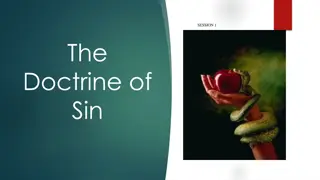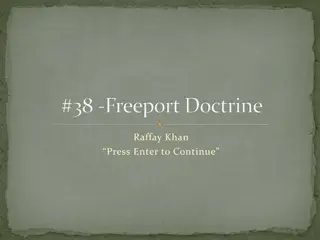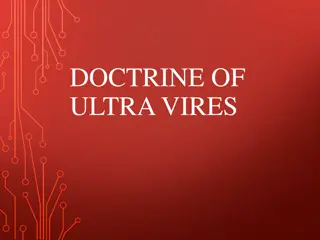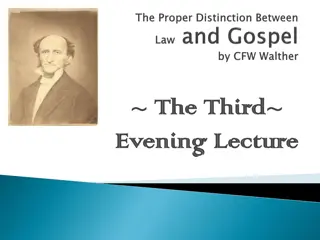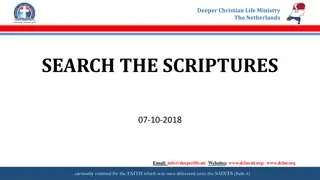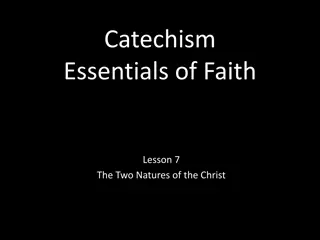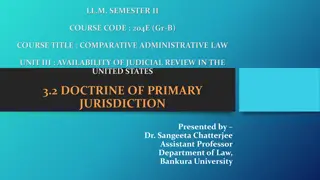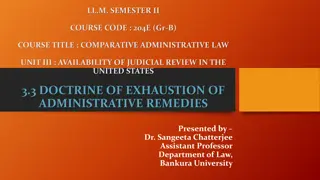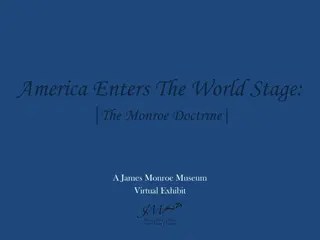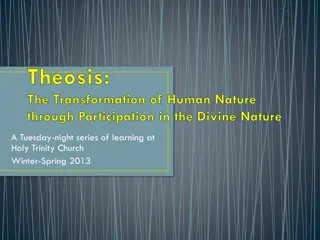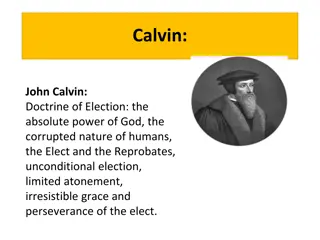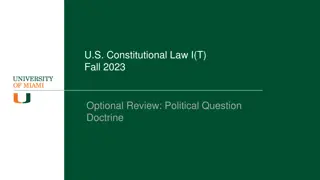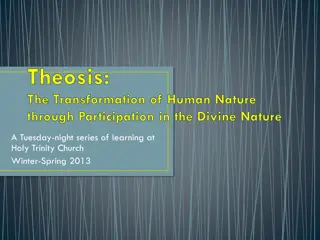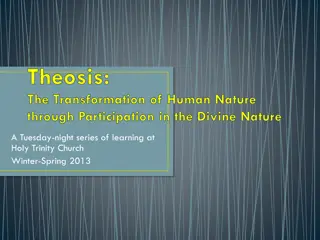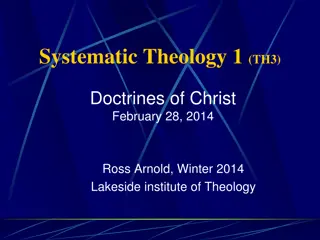Theosis: The Transformation of Human Nature in Christian Doctrine
Explore the concept of theosis, the transformation of human nature through participation in the divine nature, as seen in Biblical foundations such as Genesis, Psalms, and New Testament writings. Delve into questions about the development of this doctrine, its manifestation in worship, and its relevance in modern times.
Uploaded on Sep 11, 2024 | 2 Views
Download Presentation

Please find below an Image/Link to download the presentation.
The content on the website is provided AS IS for your information and personal use only. It may not be sold, licensed, or shared on other websites without obtaining consent from the author. Download presentation by click this link. If you encounter any issues during the download, it is possible that the publisher has removed the file from their server.
E N D
Presentation Transcript
Theosis: The Transformation of Human Nature through Participation in the Divine Nature A Tuesday-night series of learning at Holy Trinity Church Winter-Spring 2013
Some Basic Questions Is theosis a pagan or a Christian concept? Is it found in the Old and New Testaments of the Christian Bible? How did the Fathers of the Church develop this doctrine? How does the doctrine manifest itself in the church s worship and expressions of faith? How does one attain to theosis/deification? What does it mean for us today?
Biblical Foundations Genesis 1:26-27 Then God said, Let us make man ( adam) in our image, after our likeness So God created man in his own image, in the image of God he created him; male and female he created them. Genesis 3:5 But the serpent said to the woman, You will not die. For God knows that when you eat of it your eyes will be opened, and you will be like God (or gods, elohim), knowing (or, knowers of) good and evil.
Biblical Foundations Psalm 82:1, 6-7 God has taken his place in the divine council; in the midst of the gods ( elohim) he holds judgment I say, You are gods, sons of the Most High, all of you; nevertheless, you shall die like men, and fall like any prince. John 10:34-35 Jesus answered them, Is it not written in your law, I said, you are gods ( ) ? If he called them gods to whom the word of God came Matthew 5:48 Be perfect ( ), therefore, as your heavenly Father is perfect.
Biblical Foundations 2 Corinthians 3:18 And we all, with uncovered face, beholding the glory of the Lord as (though reflected) in a mirror, are being transformed into the same image from one degree of glory to another. 1 John 3:2-3 Beloved, we are God s children now; it does not yet appear what we shall be, but we know that when he appears we shall be like him, for we shall see him as he is. And every one who thus hopes in him purifies himself as he is pure.
Biblical Foundations 2 Peter 1:3-4 His divine power has given us everything needed for life and godliness, through the knowledge of him who called us by his own glory and goodness. Thus he has given us, through these things, his precious and very great promises, so that through them you may escape from the corruption that is in the world because of lust, and may become participants of the divine nature ( ).
Earliest Approaches to Theosis Context of early Christian beliefs about deification: The Jewish opponents of Christianity (Justin Martyr) The Graeco-Roman pagan context (Justin, Tatian) The Gnostic challenge to church orthodoxy and hierarchy (Irenaeus of Lyons, Hippolytus of Rome)
Basic Concepts Pairs of Opposites: Uncreated / Created Immortal / Mortal Divine / Human Pairs of theological concepts: Image and Likeness Ousia [essence] and Energeia [energy]
Basic Concepts Greek philosophy provided three formulae: Imitation of the divine Participation in the divine Ascent of the soul to the divine Imitation related to practice of the virtues. Participation and ascent related to contemplation or theoria (vision), implying an encounter with divine light.
Basic Concepts Judeo-Christian tradition contributed: Image and likeness and restoration of the divine likeness after the fall. Filiation or adoption as a son or daughter of God. Divine-human exchange: God became human so that humans might become divine. (Incarnation) Divine-human synergy. Ecclesial and corporate aspects in the sacraments.
Schools and Teachers Early Christians existed among pagan philosophical schools and rabbinic schools. Hence it was only natural to form their own. Many of the early Christian leaders we call fathers were themselves teachers or students of Christian teachers. Usually these were not separated from the local church and bishop. Some of those who were teachers in this way: Basilides and Carpocrates in Alexandria, Aristides in Athens, Marcion, Valentinus and Justin in Rome.
Schools and Teachers Some early Christian schools focused on esoteric knowledge for the true Christians ; Others followed the path of Know thyself ; Others taught this world is an illusion and sought union with God outside the pattern of salvation focused on the Church and the reality of this world. The most successful groups that operated outside the realms of orthodoxy were the Gnostics. Their range and diversity is astonishingly wide. Valentinus (c. 100-175) was one of the most famous founders of a Gnostic school.
Valentinian teachings on deification The Gospel of Truth, among the Nag Hammadi discoveries, is possibly the earliest surviving text of Christian mysticism, and may have been authored by Valentinus himself. It encourages believers to turn inwards, to find knowledge and through Christ to return to the source of being. The material world is illusory, but truth is unchangeable. Ordinary believers are subject to the soul s forgetfulness. Solution to this error is gnosis understood to be personal and experiential rather than philosophical. Process of pursuing and acquiring gnosis is a solitary path of self-discovery.
Valentinian teachings on deification The believer is to stretch upwards for salvation and doing so discovers that gnosis reaches down to us. Final goal is repose in the Father; all who emanate from the Father will return to Him. [Emanations are a huge part of Gnostic teachings.] But knowledge of the Father is never absolute or total, for He always remains hidden, unnameable and indescribable. These ideas influenced the formation of orthodox teachings either through direct borrowing or through rebuttal and rejection.
Justin Martyr (c. 100-165) Founded didaskaleion in Rome. Among his disciples were Tatian and perhaps even Irenaeus. Explicated Christian faith to non-Christians, both Graeco- Roman pagans and Jews. Influenced by Greek philosophical schools he is also referred in the Orthodox tradition as Justin the Philosopher . He understood the goal, telos, of life was to see God. However, he doubted that philosophy by itself could achieve this.
Justin Martyr (c. 100-165) Key event in his life was encounter with an old man at seashore, who asked him: What affinity is there between us and God? Is the soul divine and immortal and a part of that royal intellect [which Plato describes]? No, the affinity we have with God is moral, not ontological. No one will see God except he who shall have lived righteously, purified by righteousness and every other virtue. The fullness of the logos is Christ, in whom people have shared in part throughout human history (e.g. Socrates and Heraclitus) by the operation of the logos spermatikos, the sowing logos who sows the seeds of truth.
Justin Martyr (c. 100-165) The full possession of the divine logos can only take place through the personal knowledge of the incarnate logos that comes by grace, especially via baptism and the Eucharist. Knowledge of God not an external knowledge. It is an intimate, personal knowledge that comes from living the life of Christ and participating in it. Initiated by the new birth and illumination of baptism, this knowledge needs to be nurtured by the Eucharist. For the Eucharist is not received as common bread and wine; it is Christ s flesh and blood, nourishing our own flesh and blood by a transformation.
Justin Martyr (c. 100-165) In Psalm 82:6, I said, you are gods, and all of you sons of the Most High, the words which follow, You shall die like men, and you shall fall like one of the princes, were addressed originally to Adam and Eve, who had once been immortal but after their transgression had become subject to death and had fallen like one of the princes, namely, Satan. The destiny which was intended for Adam and Eve is attainable by Christians because they have become children of God through obedience to the commandments of Christ. Justin Martyr turned Judaism s obedience to the Torah into obedience to the commandments of Christ.
Epistle to Diognetus urges the imitation of God through knowledge and love of the Father. The imitation of God does not lie in the acquisition of power or wealth. We must show love to the weak and the needy: whoever takes on himself the burden of his neighbor, whoever supplies to the needy what he has received himself from God becomes a god to those who receive from him; such a man is an imitator of God. This combines the Christian virtue of almsgiving with the Hellenistic view that a man is a god to his beneficiaries, by analogy. Discourse to the Greeks urges the Greeks to be instructed by the divine Logos. The Logos, but by educating them makes mortals immortal, mere human beings gods, and transfers them to realms whose bounds are beyond Olympus.
Tatian (c. 120-180) He rejects the Greek definition of man as a rational animal capable of receiving nous and knowledge and proposes that man is a being made in the image and likeness of God who has advanced far beyond his humanity towards God himself. This advance is not achieved through shedding the body and the lower part of the soul as in Hellenism, but through the spiritualization of both body and soul. The human person is constituted of a body, a material spirit (the soul), and a spiritual spirit (the pneuma), which alone is made in the image and likeness of God. The first human beings were endowed with both a material and a spiritual pneuma and therefore enjoyed immortality.
Tatian (c. 120-180) The way of return entails the recovery of immortality through union with the Holy Spirit. When we bring the soul into union with the spirit, we can obtain the heavenly garment of mortality, which is immortality. It is this which enables man to advance far beyond his humanity to God himself. Fallen angels are robbers of the divine because they have seized divinity for themselves. But human beings transcend their humanity because they receive as a gift from God a participation in the immortality that belongs properly to him alone. The greatest obstacle to this return is the sexual act, and the eating of meat and the drinking of wine!
Theophilus of Antioch (2ndcentury) Man was not created immortal, as most people thought. After creating him, God transferred him from the earth out of which he was made to a paradise between heaven and earth, giving him an opportunity for progress so that by growing and becoming mature, and furthermore having been declared a god, he might also ascend into heaven (for man was created in an intermediate state, neither entirely mortal nor entirely immortal, but capable of either state). By keeping God s commandments, he would win immortality as a reward from him and become a god ; by disobeying God, he would be responsible for his own death.
Irenaeus of Lyons (c. 115-202) His purpose was to demonstrate the possibility of attainment of incorruption by all Christians, not just a spiritual elite. If the rank and file of the Church can attain immortality and become gods , it is by virtue of the Incarnation and the sacraments of baptism and the Eucharist. His polemic was primarily against Gnostics. Psalm 82 refers to those who fail to honor the incarnation of the Word and thus deprive humans of the ascent to God. We can only attain immortality and incorruption if God first unites himself to the human race through the incarnation of the Logos.
Irenaeus of Lyons (c. 115-202) Irenaeus makes a distinction between image and likeness. The image of the as yet invisible Son was manifested in Adam s body; the likeness was communicated by the Spirit and was manifested in Adam s participation in the Son s divine life and freedom. Man was created free with a good will and the power of choice. Man exercises his freedom in willingly submitting to the will of God. It is this free choice of the good which maintains his likeness to God. Through obedience he possesses life and the freedom of a son; through disobedience he loses these and is reduced to slavery and death.
Irenaeus of Lyons (c. 115-202) Against the Gnostics, Irenaeus taught that the Incarnation was a true union of God with man. It took place to recover what was lost in Adam and to complete our growth to full maturity. As mediator, Christ accommodates God to humanity and enables human beings to receive God. Because of his infinite love he became what we are in order to make us what he is himself. The exchange formula in Paul: Christ became poor, so that by his poverty you might become rich (2 Cor. 8: 9). The exchange is an exchange of properties, not an identity of essence. Our adoption through baptism endows us with Christ s immortality and incorruption.
Irenaeus of Lyons (c. 115-202) There is nothing automatic about our progress towards incorruption and immortality. It depends on our moral behavior and on our participation in the sacraments, which together attain the divine likeness, morality being linked with the freedom and the sacraments with the life of the divine likeness. Adoption as sons and daughters makes human beings gods because it gives us participation in the source of life. The progressive nature of this participation: people become gods at the stage of adoption, for this is when they regain the divine likeness and begin to participate in the freedom and immortality that belong to God.
Irenaeus of Lyons (c. 115-202) Against the Gnostics Irenaeus insists that the body, as an integral part of the human person, is capable of incorruption. The seed of incorruption is possessed here below but the full fruit is only harvested with the resurrection. At that time, incorruptibility will penetrate the whole of the human person, body and soul. On the sacramental level, the body is nourished by the body and blood of the Lord. Just as the bread is changed spiritually by the prayers, so our bodies when they receive communion. Heavenly and earthly realities are united. Our bodies, nourished by the Eucharist, return to the ground and rise at the appointed time to resurrection.
Summary of Irenaeus Against the Gnostic teachings of an esoteric Christianity for elite Christians, Irenaeus proclaimed a true Christianity available to all, with foundation the Incarnation of Christ and participation in the sacraments of Baptism and the Eucharist, and confirmed by the continuity of ecclesiastical witness from the apostles onward. Exchange formula by which God became human in order that the human could become divine. The deified body of Christ is the basis for human participation in the divine. Exchange of properties but not identity in substance. Believers are made sons by adoption.
Hippolytus of Rome (c. 170-235) Hippolytus is remarkable for using the expression without reference to Psalm 82: 6 and also for being one of the first writers to use the term - in a Christian context. Against the Gnostics he insists that a human being is not a failed god: If God had wished to make you a god, he could have done so. But a human being can become a god through obedience in virtue of Christ s renewal of mankind. If faithful in small things, we are entrusted with great things. These great things are no less than the attributes of the Father, which have been granted to the Son and are promised to the believer in the life to come.
Hippolytus of Rome (c. 170-235) Whatever sufferings you endured, these he gave you because you are human, but whatever is connected with God, these God promised to bestow on you, because you have been deified and born immortal ( , ). This is the meaning of Know thyself , to have known the God who made you. For to know yourself is concomitant with being known by him by whom you have been called. Do not be at enmity with one another, O men, nor hesitate to return When you have obeyed his solemn precepts, and have become a good imitator of him who is good, you will be like him. For God is not impoverished by also making you a god to his glory.
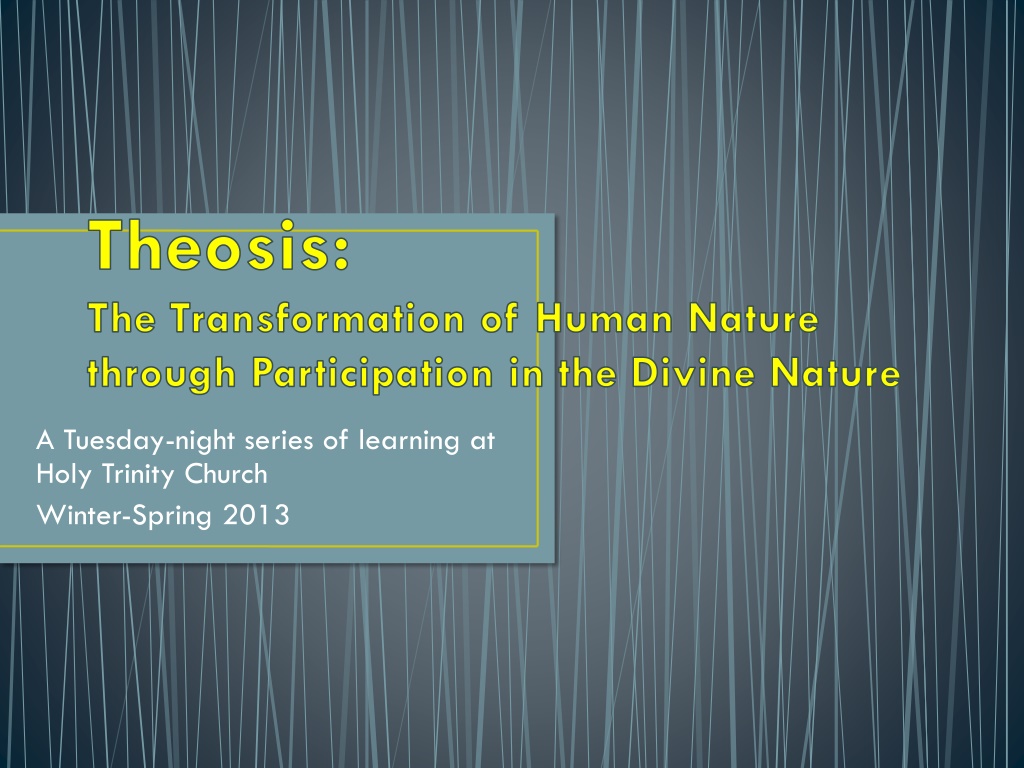
 undefined
undefined






